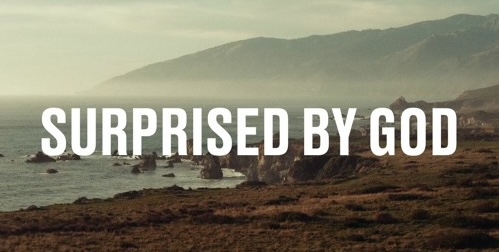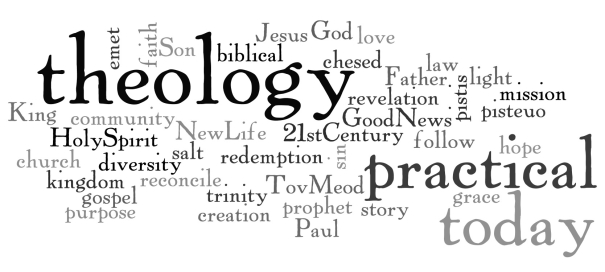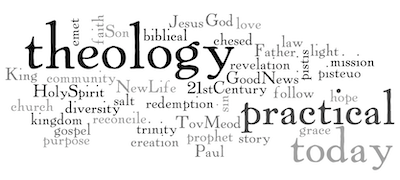Throughout my ministry career, I have always used the philosophical “Modus operandi” that everything’s a surprise at _______ (fill in the blank). This was certainly the MO of Young Life over the years. Heck, my introduction to the ministry came from taking ten kids to a Young Life camp in Colorado – and everything was truly a surprise. We did mystery road trips where kids had no idea what to expect. We told them what they should pack and the rest was a surprise.
That philosophy translated when serving in Church youth ministry opportunities as well. I wanted the leaders (and the kids) to understand that “everything’s a surprise” is theologically solid.
We read a book to our own kids as they were growing up – Theirs is the Kingdom. It is a wonderfully written story of Jesus. It is not a children’s Bible, per se. It is more of an aggregate narrative of all the gospel writings. The title of one of the sections of the book particularly captured my attention: The Surprise of the Kingdom. I remember thinking the title was apropos of God’s character displayed through the centuries and especially through Jesus. Everything Jesus did and said was a complete surprise to all witnesses.
Living the Christian life is not a well-laid-out journey. We really don’t know what each hour/day/week/years(s) might hold. It’s a journey full of surprises. If we want otherwise, we might want to pick a different religion!

Why don’t we like surprises? I’m guessing because then things are out of our control and that’s pretty uncomfortable. We prefer comfort and control. But in our preference for comfort and control, Jesus has to be pushed to the wings. They aren’t congruent.
Think of Jesus calling people to follow him, especially the fishermen. Come follow me and I’ll make you fishers of people. That’s all he told them, The rest was… wait for it, a surprise. We have no indication that other disciples had even that much definition as to what lay ahead when he invited them to follow. They didn’t know what was going on half the time, but they followed anyway because Jesus’ words had the ring of eternal life (John 6:68-69, JB Phillips).
What I think might relate to Christ-followers in the 21st century is Jesus’ discourse with the Pharisee Nicodemus. It was a bit of a primer of the life in the Spirit. As Jesus spoke with Nicodemus, he metaphorically related the Spirit of God with the wind that blows where it pleases…
The wind [or spirit] blows all around us as if it has a will of its own; we feel and hear it, but we do not understand where it has come from or where it will end up. Life in the Spirit is as if it were the wind of God (John 3:8, The Voice).
The wind of God, carrying us along where He wants to take us. In following Jesus, God’s Spirit, the Holy Spirit, takes us places we don’t expect or anticipate. Following Jesus, being led by the Holy Spirit, is the penultimate mystery road trip, full of surprises. Read the book of Acts and pay close attention to how the Holy Spirit directed the lives of the first followers. Nothing was as they thought it would/should be.
Everything was a surprise for the early followers
At Pentecost they spoke about Jesus in languages they never learned. Peter never thought he would eat non-kosher food. Surprise, he did. Especially follow the life of the Apostle Paul. Jesus surprised him while on a literal road trip to Damascus to arrest Christians and bring them back to Jerusalem for trial. On that trip the wind started to blow in a different direction for him. That same wind, the Holy Spirit, directed the remainder of his life taking him to places he never anticipated.
Think about it. Paul had his life all figured out at a young age. He was a graduate theology student under the tutelage of Gamaliel, one of the greatest first-century rabbis. Paul’s credentials according to the Jewish objective rubric of righteousness:
Circumcised? On the eighth day. Race? Israelite. Tribe? Benjamin. Descent? Hebrew through and through. Torah-observance? A Pharisee. Zealous? I persecuted the church! Official status under the law? Blameless. (Philippians 3:5-6, New Testament for Everyone).
Paul had comfort and control. He knew the Torah and its implications. He knew and banked on God’s promises. Cause and effect. A statement David Hubbard made in the introduction of his commentary on Proverbs comes to mind…
“We cannot use Proverbs like subway tokens to open the turnstile every time. They are guidelines, not mechanical formulas. They are procedures to follow, not promises we claim. We heed them the best we can, try to gain the wisdom that experience can teach, and then leave large amounts of room for God to surprise us with outcomes different from what our plans prescribe.”1 (My emphasis)
God surprised Paul with outcomes different than his plans and objective approach to faith prescribed. God introduced him to the Holy Spirit and to a subjective experience.2 The rest is, as we say, history. The Holy Spirit took Paul on a mystery road trip that was substantially different than he probably anticipated. Some of the surprises of that road trip…
24 Five times I received the forty lashes minus one from the Jews. 25 Three times I was beaten with rods. Once I received a stoning. Three times I was shipwrecked. I have spent a night and a day in the open sea. 26 On frequent journeys, I faced dangers from rivers, dangers from robbers, dangers from my own people, dangers from Gentiles, dangers in the city, dangers in the wilderness, dangers at sea, and dangers among false brothers; 27 toil and hardship, many sleepless nights, hunger and thirst, often without food, cold, and without clothing. 28 Not to mention[a] other things, there is the daily pressure on me: my concern for all the churches (2 Corinthians 11:24-28, CSB).
Though God surprised him with outcomes different than his plans prescribed, Paul had no regrets…
“Whatever former things were gains to me [as I thought then], these things [once regarded as advancements in merit] I have come to consider as loss [absolutely worthless] for the sake of Christ [and the purpose which He has given my life]” (Philippians 3:7, Amplified Bible)
May we, like Paul, allow God to surprise us with outcomes different than our plans prescribed. Experience suggests we will have no regrets.
1Hubbard, D. A. (1989). The communicator’s commentary. Proverbs. Word Books.
2In his book, Galatians for You, Timothy Keller suggests, “The Spirit brings us a radically subjective experience” (p. 99). I think I will want to dig into this idea more!










